Welcome New CDCB Members
Many new faces have joined us since OHSU's modified operations began in March. We have created this page where you will find a photo and bio for CDCB's new faculty, staff, and students. Welcome to CDCB!
Administration

Nicole Yoder
Administrative Coordinator, Department of Cell, Developmental & Cancer Biology
Anand lab

Arthur Affleck, M.D.
Surgical Resident

Adrian Baris
Graduate Student
Brody lab
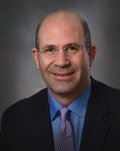
Jonathan Brody, Ph.D.
Professor, Department of Cell, Developmental & Cancer Biology
Associate Director, Translational Research, Brenden-Colson Center for Pancreatic Care
Dr. Jonathan Brody is the Vice Chair of Research for the Dept. of Surgery and is the Associate Director of Translational Research of the Brenden-Colson Pancreatic Center for Patient Care. He was a member and co-leader of the GI Cancer Program at the Sidney Kimmel Cancer Center (Thomas Jefferson University 2006-2020). Dr. Brody received his Ph.D. from The Johns Hopkins University School of Medicine, and his thesis specialized in studying the molecular aspects of cancer and cancer genetics. He patented, with Dr. Scott Kern, novel buffers for DNA identification (DNA electrophoresis buffer), that have changed the format of this molecular biology technique used to detect DNA. He was elected Chair of the Cancer Research Program (PRCRP), Department of Defense council and serves on many international study sections, including currently being the Chair of the Tumor Biology and Genomics study section for the American Cancer Society and a permanent member of the Cancer Prevention Study Section NCI study section panel. He has published over 135 peer review publications in many top tier scientific and cancer journals. Additionally, he was an American Cancer Society Research Scholar, is NIH (NCI, R01) funded, and won the American Association of Cancer Research, Pancreatic Cancer Career Development Award in 2010.

Roberto DiNiro, Ph.D.
Lab Manager
Dr. Roberto DiNiro trained as a molecular biologist and earned his PhD in his home country of Italy. He has since worked in the biotechnology and immunology fields in Oslo, Norway, and in the United States at Yale University. Roberto joins the Brody group as lab manager, with the goal of providing logistic support to all the activities in the lab. Outside of science, Roberto loves everything outdoors.
Grace McCarthy
Graduate Student
Grace is a 4th year Ph.D. candidate. Grace joined the lab in 2018 at Jefferson University in Philadelphia. Since then, she has transferred to OHSU to continue her graduate studies in the Brody lab. Her thesis work revolves around investigating the role of HuR in pancreatic ductal adenocarcinoma metastasis. Additionally, she works closely with the company Code Bio in developing a targeted nanocarrier to silence HuR for treatment of pancreatic cancer. Outside her studies, Grace enjoys hiking, playing tennis, and pulling pranks on her lab mates.
Burger lab

Megan Burger, PhD
Assistant Professor, Department of Cell, Developmental & Cancer Biology and Division of Hematology/Medical Oncology
Dr. Burger focuses on activating T cell immunity in lung cancer.
Byrne lab
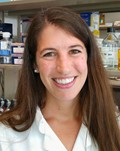
Kate Byrne, Ph.D.
Assistant Professor, Department of Cell, Developmental & Cancer Biology, Brendon-Colson Center for Pancreatic Care, and the Knight Cancer Institute
The main focus of the Byrne Lab is to investigate the immunobiology of the pancreatic tumor microenvironment, with the long-term goal of generating novel therapies for enhancing immune responses in patients.
Copenhaver lab

Zoe Bostick
Research Assistant 2
Coussens lab

Eric Berens, Ph.D.
Postdoctoral Scholar
Dr. Eric Berens grew up mostly in Minnesota, earning a B.A. in Biology from Saint Olaf College and thereafter a M.S. degree from the University of Minnesota. He next obtained his Ph.D. at Georgetown University in Washington, DC under the mentorship of Dr. Anton Wellstein and Dr. Anna Riegel. He was then a postdoc for two years at UCSF in Dr. Zena Werb’s laboratory until her unexpected death last June. Dr. Werb and Dr. Coussens were longstanding colleagues so Dr. Berens' transition to OHSU feels very natural. In truth, the Coussens Lab had been on his radar since his pre-doctoral years, and is now lucky to call it his new postdoctoral home.
The study of breast cancer metastasis has been Dr. Berens prevailing interest since his M.S. degree, when he initially explored interactions between cancer cells and macrophages in vitro. During his Ph.D., he then characterized two genes within the context of cancer cell vascular invasion as a key step of metastasis: a regulator of the cytoskeleton (KRTAP5-5), and a regulator of mitotic fidelity and cell polarity (MST4). As a postdoc, he has recently developed an interest in the possible cooption of immune surface markers by cancer cells during dissemination. Dr. Berens considers himself a generalist in research, although his skillset hoovers mostly around cell biology techniques.
Dr. Berens' leisure activities are all fairly introverted. He enjoys reading books (especially classic literature), cooking, listening to music, running outdoors, and now learning some immunology too.

Erik Cid, B.S.
Research Assistant II
I have always been interested in how the body functions and how it develops immunity towards foreign and localized invaders such as with viruses and cancer/tumors. I am excited to seek better ways to accomplish the goal at hand with a great team. Erik received a B.S. in Biochemistry from the University of Oregon in 2018.
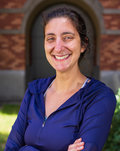
Ana Howells-Ferreira, M.S.
Computational Biologist
Ana received her M.S. in Bioinformatics and Genomics at the University of Oregon in 2018. She attended Georgia State University, graduating with a B.S. in Biology in 2008. She's a women's volleyball scholarship recipient and member of Women in Science, Portland.
Ana's primary scientific interests include T cell biology and the tumor microenvironment. She enjoys working on effective communication by applying data visualization principles, generating interactive reports and making use of best practices in software development to work with researchers as a team.
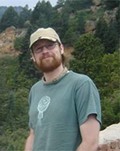
Michael McCane
Senior Research Assistant
Eil lab

Robert Eil, M.D., Ph.D.
Assistant Professor
Surgery
Cell, Developmental & Cancer Biology
Camille Collier
Research Assistant
Scientific Interests: At Penn, I studied underlying mechanisms of stem cell behavior and tissue transformation. I bring this background to the Eil Lab, where I am interested in ascertaining and optimizing T cell physiology within the tumor microenvironment.

Chelsea Jenkins, Ph.D.
Senior Research Associate
Education: Ph.D., Cancer Biology, OHSU.
Scientific interests: Chelsea earned her Ph.D. in Cancer Biology in the Tyner Lab at OHSU while studying leukemia cell signaling. She has worked on additional projects associated with solid tumors, lineage plasticity, and cell receptor function in tumorigenesis before joining the Eil lab.
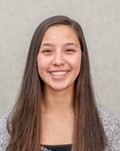
Kelly Wucherer
Research Assistant 2
Enns lab

Tyler Weiskopf
Research Assistant 2
Malhotra lab
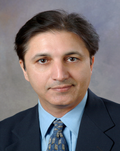
Sanjay Malhotra, Ph.D.
Professor, Department of Cell, Developmental & Cancer Biology
Director, Center for Experimental Therapeutics, Knight Cancer Institute
Dr. Sanjay Malhotra's research interests focus on the design and discovery of synthetic and natural product inspired small molecules, which can provide insight into biological mechanisms and disease targets. Dr. Malhotra's laboratory employs the tools of synthetic medicinal chemistry, molecular modeling and chemical biology for translational research in drug discovery, development, imaging and radiation. The key aims of Dr. Malhotra's research are (i) to design probe molecules that can be used to characterize the functions of particular proteins or drive specific cellular phenotypes, (ii) discover compounds that could be turned into drugs for human diseases and, (iii) educate the next generation of drug hunters.

Arpit Dheeraj, Ph.D.
Postdoctoral Scholar
Dr. Arpit Dheeraj completed his Ph.D. in Cancer Biology in 2019 from Jawaharlal Nehru University, India under the guidance of Prof. Rana P. Singh. The primary focus of his dissertation work was to understand the role of IGFBP-3 (Insulin-like Growth Factor Binding Protein-3), an essential component of the IGF system, on prostate cancer progression. Objectives of the study were to identify the effects of IGFBP-3 on tumor angiogenesis and metastasis under normoxia and hypoxic conditions. His studies showed that IGFBP-3 inhibited the overall growth of prostate cancer cells, IGFBP-3 overexpression inhibited angiogenesis, and reduced endothelial cell growth and migration. IGFBP-3 modulated the expression of different mitogenic and pro-survival signaling mediators which resulted in the altered biological function of cancer cells. IGFBP-3 overexpression inhibited migration under normoxic conditions; however, within the hypoxic environment, IGFBP-3 overexpression increased cell migration. Overall, these findings show that IGFBP-3 targets different steps of prostate cancer growth and progression and it could be a potential therapeutic target.
Arpit is studying the mechanism of treatment resistance in Head & Neck, and Triple negative breast cancer using chemical probes developed in Malhotra lab.

Marie Foss, Ph.D.
Senior Research Associate
Dr. Marie Foss is interested in research at the interface of chemistry and biology, especially the discovery of chemical biological tools to study biological systems and small molecule drug development. She obtained her B.S. (chemistry, biochemistry) from the University of Minnesota-Duluth with training in synthetic chemistry from Prof. Steven Berry. Her graduate education at the University of Wisconsin-Madison in biochemistry involved the study of bacterial physiology under the direction of Prof. Douglas Weibel. Dr. Foss received postdoctoral training in the tuberculosis host-pathogen interface at OHSU under the guidance of Prof. Georgiana Purdy. Most recently, Dr. Foss served as senior research scientist at Neuralexo, INC to develop agonists of the innate immune system. Dr. Foss is encouraged by the potential that engagement of the innate immune system has for the treatment of cancer and looks forward to the development of therapeutics based on this strategy.
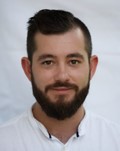
Benedikt Grau, Ph.D.
Postdoctoral Scholar
Education: Ph.D., Chair of organic Chemistry II, Friedrich-Alexander-University Erlangen-Nuernberg, Germany.
Scientific interests: Dr. Grau is interested in the development of novel synthetic methodologies and their utilization in the synthesis of natural product inspired small molecule scaffolds. With his colleagues in the biological department, he aims to identify correlations between bioactive molecule motifs and their bioactivity. His research expertise includes organic and medical chemistry, organocatalysis, multi-step synthesis, hybridisation, and drug discovery.
Dr. Grau completed his PhD under the supervision of Professor S. B. Tsogoeva in October of 2021 at Friedrich-Alexander University in Erlangen, Germany. His research mainly focused on the development of novel base or organocatalyzed one-pot procedures and domino-reactions towards novel terphenyl core structures. Triarylbenzenes (TAB), which bore three different functional groups and enabled the development of a multi-step synthesis route towards Hexaarylbenzene (HAB) with 6 different rings. This work identified novel scaffolds and hybrid-molecules exhibiting bioactivity in the treatment of diseases e.g., malaria, cancer, the coronavirus (COVID-19) and the human cytomegalovirus (HCMV).

Alexander Honkala
Senior Research Assistant
Alexander Honkala is a Researcher in the laboratory of Dr. Sanjay Malhotra in the Knight Cancer Institute Center for Experimental Therapeutics, where he focuses on the clinical translation of promising new small molecule drugs and the biology underlying cancer resistance to treatment. His background is in cell and molecular biology with a strong focus on immunology, which he has used to study everything from host-pathogen interactions to aging and from tumor microenvironment modulation to gene therapy. With years of experience in biotech start-ups, consulting for pharma and tech clients alike, and developing STEM-focused educational non-profits, Alexander enjoys being on the cutting edge, focused on the key next steps to turn imaginative science fiction into new science reality. When he’s not in meetings or dancing at his desk, he can be found hiking, cooking, or stubbornly making awful music.

Sreenu Jennepalli, Ph.D.
Research Associate
Education: Ph.D., Organic synthesis, Medicinal Chemistry, University of Wollongong, Wollongong, Australia.
Scientific interests: Dr. Jennepalli is a Research Associate at the OHSU Knight Cancer Institute’s Center for Experimental Therapeutics (CET). He works on new therapeutic targets with applications in Cancer and Cardiovascular research. His research expertise includes Organic and Medicinal chemistry, peptide synthesis, carbohydrate and nucleoside chemistry and drug discovery.
Dr. Jennepalli worked as a drug discovery Scientist in leading drug discovery companies such as Dr Reddy’s laboratories and Hetero Drugs Ltd, in India. He mainly worked on anti-cancer, cardiovascular and anti-viral drug development. He was a significant contributor in one of the PHASE II clinical trial Cardiovascular drugs from Dr. Reddy’s Laboratories. He then pursued his Ph.D. in Chemistry from the University of Wollongong, Australia, where his research focused on the synthesis of C60 Fullerenyl amino acids and water-soluble peptides, and peptidomimetics for medicinal chemistry applications. During postdoctoral work at the UOW and University of New South Wales, he worked on the synthesis and development of cationic peptidomimetic amphiphiles as anti-bacterial drug candidates. He also has experience in organometallic chemistry and polymer chemistry. With over 15 years of organic synthesis and drug discovery experience, at the CET, Sreenu will design and synthesize small molecules for translational research in the fields of cancer and cardiovascular diseases.

Wendy Li, M.S.
Research Assistant 2
Education: M.S., Toxicology, University of Kentucky.
Scientific interests: Wendy is a research assistant, interested in biochemistry and biology in oncology, and the transformations under treatments. After obtaining her Master’s degree of Toxicology from University of Kentucky, Wendy studied the effects of heavy metals as carcinogen in skin, lung and colon cancer. She joined OHSU in 2017 to work with the Bergan lab, on novel compounds for experimental prostate cancer treatments. Wendy joined Malhotra group in 2021. She is working with the team on discovery and development of small molecules for experimental therapeutics.

Jee Min Lee
Graduate Student

Mallesh Pandrala, Ph.D.
Assistant Staff Scientist
Dr. Mallesh Pandrala is an assistant staff scientist at the OHSU Knight Cancer Institute’s Center for Experimental Therapeutics (CET). He works with colleagues in chemical biology and biology to drive the discovery of new therapeutics with applications in cancer and microbial research. His research expertise includes organic and inorganic chemistry, peptide synthesis, medicinal chemistry, drug discovery, and pharmacokinetic studies.
Dr. Pandrala worked as a process chemist and drug discovery chemist in leading drug discovery companies such as Dr Reddy’s laboratories and Jubilant Biosys in India. He then pursued his Ph.D. in Chemistry from the University of New South Wales (UNSW) Canberra, Australia, where his research focused on therapeutic properties of mono- and di- nuclear Iridium(III) complexes. During postdoctoral work at the University of Puerto Rico (UPR-Rio Piedras), he developed synthetic strategies to conjugate small molecules to bioactive peptides to improve selective drug delivery to cancer cells. As a postdoctoral researcher and research scientist in the Department of Radiation Oncology, Stanford University, he developed small molecule kinase inhibitors of the BCR-ABL1 oncogene, small molecules that can be utilized in preventing or reversing T cell exhaustion. He developed strategies to synthesize prodrugs for approved drugs to improve their pharmacokinetic properties. Furthermore, he developed pharmacokinetic assays using LC-MS for various drug molecules. With over 12 years of organic and inorganic synthesis and drug discovery experience, at CET, Mallesh will design and synthesize small molecules for translational research in the fields of cancer and microbiology. In addition, he is interested in developing strategies to study pharmacokinetics of new drug molecules.
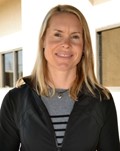
Kirsten Stefan, Ph.D.
Research Associate
Scientific Interests: Dr. Stefan is interested in drug discovery for sarcomas in a bench to bedside approach to help bring novel therapies to patients. Her Ph.D. work was focused on the effects of omega-3 polyunsaturated fatty acids on T cell function as it relates to inflammation and autoimmunity. Her post-doctoral training in the Department of Immunology at Baylor College of Medicine explored detailed mechanisms of autoimmunity, with particular focus on T cell and B cell involvement. Most recently, Dr. Stefan served as research scientist at M.D. Anderson Cancer Center discovering means of immunotherapy for osteosarcoma including investigation of chimeric antigen receptor (CAR) T cell therapies. Prior to her focus in osteosarcoma, she worked at M.D. Anderson to help bring CD19-CAR T cells into clinical trial.

Julia Stokes, B.S.
Graduate student
Education: B.S., Cellular, Molecular, & Developmental Biology, University of Washington Seattle. Graduate Student in Program for Biomedical Science at OHSU
Scientific interests: Julia Stokes is a graduate student in the Program for Biomedical Science. After obtaining her B.S. (Cellular, Molecular, Developmental Biology) at University of Washington, she worked at Seattle Children’s Research Institute under the guidance of Dr. Simon Johnson, studying underlying mechanisms of Leigh’s Syndrome progression through mTOR signaling pathways using FDA approved pharmacological treatments (Rapamycin, Pexidartinib, etc..). Due to her research experience, she developed a strong interest in translational medicine and developing small molecule targeted therapies for various complex genetic dysfunctions. Since joining Malhotra’s Lab, Julia has started her thesis work studying small molecules that could potentially target Melanocortin-4 Receptor (MC4R) for therapeutic purposes. After graduate school, her goal is to pursue her postdoc and eventually open her own lab with a focus in translational medicine for genetic diseases caused by immune or mitochondrial disorders.

Dhanir Tailor, Ph.D.
Postdoctoral Scholar
Dr. Dhanir Tailor earned his Ph.D. in Cancer Biology from Central University of Gujarat, India in 2016. A primary focus of his thesis work was directed towards understanding the effect of physiological concentrations of butyric acid on human colorectal cancer (CRC) cell death and mitochondrial dynamics. Short-chain fatty acids including butyric acid, propionic acid, and acetic acid are present in millimolar concentrations in gastrointestinal tract, which are mainly synthesized by our gut microbiome. These short-chain fatty acid molecules have been shown to affect biological events such as cell cycle progression, differentiation and programmed cell death. Initially, he screened various short chain fatty acid (SCFA) for their cancer preventive efficacies, among which, he found Butyric acid (BA) to be a potential candidate with chemo-preventive role. His studies showed that BA decreased the overall population/mass of active mitochondria in CRC cells, which could be an indicator of mitochondrial fusion. BA mediated effect is brought about by its reduction of Dynamin related protein 1 (DRP1) protein, which is a key regulator of mitochondrial fission and fusion processes. These findings suggest that DRP1 could be a potential molecular target to induce mitochondrial fusion and inhibition of mitochondrial fission mediated by BA treatment in CRC cells. Furthermore, overexpression of DRP1 in CRC cells enhanced the rate of cell proliferation and migration. This study is the first molecular and cell culture based evidence which sheds light on the ‘Role of DRP1 in CRC cancer growth, survival and progression’.
After three years of research at Stanford University, Dhanir joined the Department of Cell, Developmental & Cancer Biology at Oregon Health & Science University in August 2020 as Postdoctoral Research Fellow and is currently working to develop radio-sensitizers, and small molecule probes to study treatment resistance.
Moran lab

Reed Hawkins
Graduate Student
Originally from Seattle, WA, Reed earned his Bachelor of Science in degree in Cellular and Molecular Biology from Seattle Pacific University. While an undergrad, Reed volunteered at Seattle Children’s Research Institute in the lab of Dr. Michael Jenson, where he aided in developing new chimeric antigen receptor (CAR) immunotherapy strategies to reinvigorate immune cell activity against cancer cells. After graduating from SPU in 2015, Reed joined as a Research Technician in the lab of Dr. Cameron Turtle at Fred Hutchinson Cancer Research Center. While at Fred Hutch, Reed studied CAR T cell immunotherapies at the clinical and pre-clinical levels to inform new therapeutic strategies with improved safety and efficacy. In 2019, Reed joined the Program in Molecular and Cellular Biology at OHSU, which eventually led him to join Dr. Amy Moran’s lab. Reed now studies the sex differences in T cell immune responses to infections and cancer, and the mechanisms by which sex hormones drive those differences. Outside of the lab, Reed enjoys going on cycling adventures, gaming, hiking, and reading.
Nechiporuk lab

Amanda Maxfield
Research Assistant 2
Amanda is a research assistant in Dr. Nechiporuk's lab where she studies collective cell migration that occurs during the development of the zebrafish lateral line primordium. She recently graduated from Lewis & Clark College with a degree in biochemistry and molecular biology. In her free time she enjoys cooking, hiking and camping.

Lindsey Royer
Research Assistant 2

Benjamin "Ben" Woodruff
Graduate Student
Ben Woodruff lived most of his life in Humboldt County, CA. There, he attended and graduated from Humboldt State University with a Bachelor of Science in Cellular and Molecular Biology and a minor in Chemistry. After undergrad, Ben spent two years at Stanford University in Dr. Stefan Heller’s lab researching stem cell biology and regeneration as they relate to inner ear biology. Ben is currently pursuing a Ph.D. in Cell and Developmental Biology at OHSU. In March of 2020, Ben joined the lab of Dr. Alex Nechiporuk where he utilizes zebrafish as a model organism to research the earliest stages of nervous system development. Ben enjoys video games, taking care of his bonsai trees, science fiction, camping, and trying different restaurants and cuisines.
Oshimori lab

Hannah Erickson
Research Assistant 2

Anish Raman
Research Assistant 2
Pucci lab
Tahereh “Tara” Ziglari, Ph.D.
Postdoctoral Scholar
Ruhland lab

Megan Ruhland, Ph.D.
Assistant Professor
Cell, Developmental & Cancer Biology
Dermatology

Kasidy Brown
Research Assistant II
Schedin lab

AeSoon Bensen
Senior Research Assistant
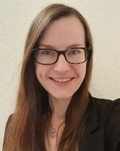
Sarah Bernhardt, Ph.D.
Postdoctoral Scholar
Scientific interests: Research from the Schedin Lab has shown that mammary gland involution is a transient, pro-inflammatory window of increased breast cancer risk that can be targeted with immune therapies for breast cancer prevention. My research focuses specifically on the preventative potential of vitamin D. Vitamin D has well-known anti-cancer, immune-modulatory functions, and the demands for vitamin D during pregnancy, lactation, and involution result in vitamin D deficiency postpartum. Using preclinical models, my research investigates how vitamin D deficiency affects the immune system during mammary gland involution, and how this altered immune response contributes to breast cancer development. My research also explores whether treatment with vitamin D can promote an immune response that prevents breast cancer growth during the postpartum period.

Elise De Wilde
Research Assistant 2
Education: Major in Biology, Minor in Chemistry, Oregon State University (2020).
Scientific Interests: My scientific interests are to be certified by ASCP in histotechnology and assist in methods in the laboratory to further research in post-partum involution-induced breast cancer. I am also assisting on several liver metastasis-based projects being researched by my colleagues. I enjoy diagnostic testing and I am excited to be able to work on my histotechnologist certification while in the Schedin laboratory.

Michelle Ozaki
Graduate Student
Michelle grew up in Los Angeles and attended Scripps College where she received her B.A. in Molecular Biology. Tired of all the traffic, she left LA and did a post-bac at the NIH in D.C. where she studied ovarian cancer under Dr. Christina Annunziata. Michelle has continued to study women's health, joining Dr. Pepper Schedin's lab for her Ph.D studies. She is currently investigating mechanisms driving liver metastases in a postpartum breast cancer setting. In her free time she enjoys exploring new restaurants and breweries, hiking, playing video games, painting, and cooking.
Shree lab

Tanaya Shree, MD, PhD
Assistant Professor, Department of Cell, Developmental & Cancer Biology and Division of Hematology/Medical Oncology
Dr. Shree seeks to understand tumor-immune interactions in patients to develop novel immunotherapy strategies, in lymphoma and beyond.
Walker lab

Rachel Nguyen, B.S.
Research Assistant 2
Wong lab

Ashley Anderson
Graduate Student
Ashley Anderson is an MD/PhD student co-mentored by Dr. Melissa Wong and Dr. Summer Gibbs. Her research in their labs broadly focuses on circulating hybrid cell biology and their role in facilitating the development of metastatic disease. Ashley graduated from the University of Portland in 2015 with a degree in biology and a focus in neuroscience, where she worked in the lab of Dr. Elinor Sullivan at the Oregon National Primate Research Center studying the effects of maternal high-fat diet on offspring neurodevelopment. Following her time at the University of Portland, Ashley worked as a research assistant at OHSU with Dr. Molly Kulesz-Martin and Dr. Shannon McWeeney investigating drug targetable pathways in squamous cell carcinomas of the skin and head & neck. After her training at OHSU, Ashley hopes to become a pediatric oncologist. Her hobbies include spending time outdoors with her husband, daughter, and dogs, reading and watching science fiction films/series, and going out with friends for some delicious food and coffee in the Portland area.

Nathaniel "Nate" Evans
Graduate student
Nate Evans is a Ph.D. candidate in the DMICE Bioinformatics and Computational Biomedicine program at OHSU. Previous to this, he studied biological physics at the University of Washington and worked as a mechanical engineer developing a lung cancer diagnostic device using 3D single-cell imaging. Nate's primary research goals revolve around developing robust drug response models to aid decision making in precision oncology. He is interested in modeling techniques that can accurately quantify prediction uncertainty. Nate's focus is on developing computational framework that incorporate (1) biologically relevant feature encodings, (2) are interpretable, (3) improve the actionability of predictions by including uncertainty and (4) include risk-aware decision making. His current work has broad translational application in drug development, combination therapy prediction, clinical patient response prediction, and patient therapy toxicity prediction. Additionally, Nate believes this work can not only support clinical studies but also provide a hypothesis testing framework to guide mechanistic studies as well.
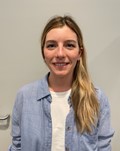
Nicole Giske
Research Assistant 2
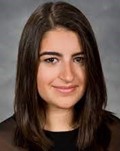
Maryam Shahin, M.D.
Surgery Resident

Ranish Patel, MD
Surgical Resident
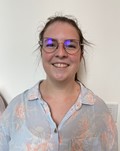
Riley Whalen
Research Assistant 2
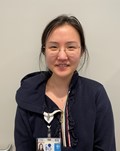
Ashley Yoo
Medical Student